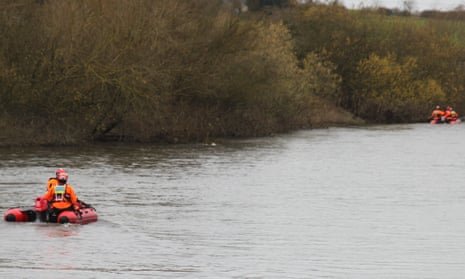It was a cold night in early January. The family of the man whose body I had recovered from a river stood in front of me, crying and clinging to one other. Their relative had disappeared one winter’s night.
As volunteers for Lowland Rescue, my team and I had spent almost 800 hours searching for him on foot, in rafts and by boat, in waterways, farms and woodland. We had taken days off work and spent evenings and weekends planning and trampling the countryside, supporting our local police service. Eventually we found him, 14 miles downstream from where he was last seen alive. He had become caught on a tree and fallen in the river.
I will never forget the day we found him. All 10 of us on the search team were desperate to find him and some have suffered from post-traumatic stress as a result of the experience. We had met his family and friends and all felt a deep desire to bring him home. A week after his body was found, his family and friends asked to meet us. Their grief was raw but they were incredibly appreciative of all our efforts. We had kept them informed throughout the period and told them all the facts. Our job isn’t to fill people with hope, but to always be honest, just like any professional working for the emergency services.
There are 2,000 volunteers like us in England, serving as unpaid members of 35 Lowland Rescue teams, on call to respond to the highest-risk and most resource-intensive searches and provide specialist support to the police. We are the least well-known part of the UK’s official search and rescue infrastructure – alongside the likes of RNLI and Mountain Rescue – because the vast majority of what we do is for the most vulnerable members of society.
We respond to missing people with dementia, mental health issues, suicidal thoughts and those who are believed to be in difficult terrain such as woodland, rivers and farmland. That means that we simply can’t publicise most of our call-outs in the same way as some of the other charities.
Recent call-outs include an elderly gentleman who wandered off from his care home next to a major river; a lady whose husband had just died and who wanted to lay down in a woodland to die herself; a missing farmer. We get no government funding. My car boot is full of torches, rescue gear and maps, all of which I have funded myself. We pay for our own fuel, personal kit and clothing and give hundreds – if not thousands – of hours every year to maintain professional training standards.
If it wasn’t for the rare opportunity to meet a family to whom we’ve made a difference or the genuine thanks from the emergency services who are under such pressure to produce results, I’m not sure we’d do this at all.
But I’m five years in now and have worked on more than 100 missing person searches. For all of us, every call-out is another chance to make a difference to a family in need and the occasional thanks we get is enough to keep us going for now.
The day I made a difference is the Guardian Voluntary Sector Network’s series that showcases the work of people involved with charities. f you have a story to share about a landmark moment in your life, email voluntarysectornetwork@theguardian.com with a short summary of your experience.
Talk to us on Twitter via @Gdnvoluntary and join our community for your free Guardian Voluntary Sector monthly newsletter, with analysis and opinion sent direct to you on the first Thursday of the month.
